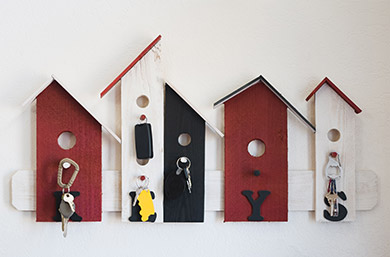Buying a property can be daunting – and when it comes to weighing up freehold vs leasehold purchases, it can be a little confusing too.
Here’s our guide to the key differences between freehold and leasehold properties – and what you need to know before you buy.
What does freehold mean?
If you buy a ‘freehold’ property, you own the building AND the land on which it sits.
Most houses are sold on a freehold basis and usually include the land around the house (such as the gardens). If you buy a freehold property, the house and land are owned by you and are your responsibility.
Some freehold purchases may come with ‘restrictive covenants.’ For example, if a house sits on a private road, or has shared gardens or parking areas, a covenant could limit the activity you can do in the shared gardens or what vehicles you can park in the car park. A covenant could also advise of liabilities you may have to pay towards upkeep and maintenance of a private road or any shared areas.
What does leasehold mean?
What’s involved in purchasing a leasehold property is generally less well understood but in simple terms, it means you own the property for a set period of time as defined in the terms of its lease.
If the property is in a block of apartments or flats, you don’t own communal areas or the structure of the building.
Maintenance of the building and structure is the responsibility of the freeholder (the person or entity that owns the building) or a middle management company may have been formed. Although you not responsible for arranging the maintenance you will be liable for a share of the costs and you will need to pay service charges to cover this.
You may also need to pay ground rent to the freeholder.
Newly-created leases can range in duration from 99 or 125 years right up to 999 years.
At the end of the lease ownership, the property technically transfers back to the freeholder, but in reality, this rarely happens as leaseholders can keep extending the term of their lease.
Extensions are a statutory right when you have been a leaseholder for two years or more. However, there are costs involved – including, in most cases, a premium payable to the freeholder granting the new lease.
Selling a leasehold property is just like selling any other property. Things only change if your lease is short, which may make it harder to find a buyer.
At Pure Block Management we’re experts at supporting people who own leasehold properties, managing developments that house many residents who are all living in their own leasehold flats and apartments.
How can you extend a lease?
If you’ve owned a property for two years or more, you have the right to extend its lease. Most leases are extended by 99 years.
It’s usually best to extend your lease as early as possible. This is because the shorter the term of the lease, the higher its value to the freeholder, who can charge a higher premium to extend it.
Other costs usually include an independent property valuation, legal fees and Land Registry fees.
Leaseholder rights and management disputes
The rights of a leaseholder are protected by UK law to prevent the freeholder from taking advantage.
Leaseholders are entitled to:
- Be consulted about any building work costing £250 or more per leasehold
- Be informed before any work is carried out that will take more than 12 months
- Be informed before work is done which will cost them more than £100 a year per leasehold
- See a summary of what their ‘service charge’ payments are spent on
- Examine how charges have been calculated
What can you do if you’re unhappy with your leasehold or freehold arrangements?
At Pure Block Management, our specialists have helped hundreds of leasehold and freehold property owners.
Some are unhappy at having to pay excessive service charges or maintenance charges. Others are dissatisfied with the way their property or development is managed or how their funds are being spent.
Depending on the set up of your development, we can advise and help you take the right action to appoint us as your new agents.
How can you gain more control as a leaseholder?
Unhappy leaseholders have the right to act collectively and ask the freeholder to transfer its management to a ‘Right To Manage’ company.
Click here for full details about the Right To Manage and how to assume these responsibilities.
To summarise, the two main options are:
1. Set up a management company with majority leaseholders to take over certain tasks from the freeholder or their agent. You can then appoint your own agent. You can do this WITHOUT having to have reason.
2. Apply to the tribunal to appoint a new agent. Bad management MUST be proven to do this, by citing issues such as a breach of agreement or unfair costs.
At Pure Block Management we already manage over 2,000 residential units in more than 100 housing and apartment developments across Yorkshire and Lincolnshire.
Our property management specialists recently transformed residents' quality of life at a Hull apartment complex by supporting them to take control of their property.
Since our intervention, the communal areas at the development have benefited from full redecoration and new carpets and new automatic LED lighting has been installed. The complex now also has a positive cash balance and reserves.
In some of the developments we manage, Apartment owners have worked together to buy the freehold of their block, giving residents direct control of building maintenance and the same security as freeholders.
If you’d like to explore either of these approaches, Pure Block Management can act on your behalf.
To get in touch with one of our experts email hello@purebm.co.uk or call 01482 326677.

